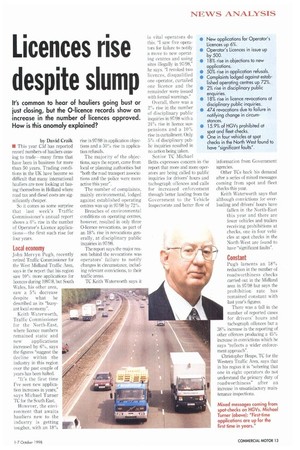Licences rise despite slum
Page 15

If you've noticed an error in this article please click here to report it so we can fix it.
It's common to hear of hauliers going bust or just closing, but the 0-licence records show an increase in the number of licences approved. How is this anomaly explained?
by David Craik • This year CM has reported record numbers of hauliers ceasing to trade---many firms that have been in business for more than 50 years. Trading conditions in the UK have become so difficult that many international hauliers are now looking at basing themselves in Holland where road tax and diesel costs are significantly cheaper.
So it comes as some surprise that last week's Traffic Commissioner's annual report shows a 6% rise in the number of Operator's Licence applications—the first such rise for four years.
Local economy
John Mervyn Pugh, recently retired Traffic Commissioner for the West Midland Traffic Area, says in the report that his region saw 10''.0 more applications for licences during 1997/8, but South Wales, his other area, saw a 5% decrease despite what he described as its "buoyant load economy".
Keith Waterworth, Traffic Commissioner for the North-East, where licence numbers remained static and new applications increased by 6%, says the figures "suggest the decline within the industry in this region over the past couple of years has been halted.
"It's the first time I've seen new application increases in years," says Michael Turner TC for the South-East.
However, the environment that awaits hauliers new to the industry is getting tougher, with an 18% rise in 97/98 in application objections and a 50% rise in application refusals.
The majority of the objections, says the report, came from local or planning authorities but "both the road transport associations and the police were more active this year".
The number of complaints, mainly environmental, lodged against established operating centres was up in 97/98 by 72%.
Breaches of environmental conditions on operating centres, however, resulted in only three 0-licence revocations, as part of an 18% rise in revocations generally, at disciplinary public inquiries in 97/98.
The report says the major reason behind the revocations was operators' failure to notify changes in circumstance, including relevant convictions, to their traffic areas.
TC Keith Waterworth says it is vital operators do this. "I saw five operators for failure to notify a move to new operating centres and using sites illegally in 97/98," he says. "I revoked two licences, disqualified one operator, curtailed one licence and the remainder were issued with formal warnings."
Overall, there was a 2% rise in the number of disciplinary public inquiries in 97/98 with a 24% rise in licence suspensions and a 10% rise in curtailment. Only 5% of disciplinary public inquiries resulted in no action being taken.
Senior IC Michael Betts expresses concern in the report that more and more operators are being called to public inquiries for drivers' hours and tachograph offences and calls for increased enforcement through better funding from the Government to the Vehicle Inspectorate and better flow of
• New applications for Operator's Licences up 6%.
• Operator's Licences in issue up by 500. • 18% rise in objections to new applications. • 50% rise in application refusals. • Complaints lodged against established operating centres up 72%.
• 2% rise in disciplinary public enquiries.
• 18% rise in licence revocations at disciplinary public inquiries. • 474 revocations due to failure in notifying change in circumstances.
• 15.9% of HGVs prohibited at spot and fleet checks. • One in four vehicles at spot checks in the North West found to have "significant faults".
information from Government agencies.
Other TCs back his demand after a series of mixed messages coming from spot and fleet checks this year.
Keith Waterworth says that although convictions for overloading and drivers' hours have fallen in the North-East this year and there are fewer vehicles and trailers receiving prohibitions at checks, one in four vehicles at spot checks in the North-West are found to have "significant faults".
Constant
Pugh laments an 18% reduction in the number of roadworthiness checks carried out in the Midland area in 97/98 but says the prohibition rate has remained constant with last year's figures.
There was a fall in the number of reported cases for drivers' hours and tachograph offences but a 38% increase in the reporting of other offences producing a 15% increase in convictions which he says "reflects a wider enforcement approach".
Christopher Heaps, IC for the Western Traffic Area, says that in his region it is "sobering that one in eight operators do not understand the primary duty of roadworthiness" after an increase in unsatisfactory maintenance inspections.
Mixed messages coming from spot-checks on HGVs. Michael Turner (above): "First-time applications are up for the first time in years."
















































































































